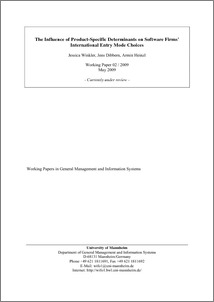|
The Influence of product-specific determinants on software firms’ international entry mode choices
Winkler, Jessica
;
Dibbern, Jens
;
Heinzl, Armin
![[img]](https://madoc.bib.uni-mannheim.de/style/images/fileicons/application_pdf.png)  Vorschau |
|
PDF
Working_Paper_2_2009.pdf
- Veröffentlichte Version
Download (198kB)
|
|
URL:
|
https://ub-madoc.bib.uni-mannheim.de/2364
|
|
URN:
|
urn:nbn:de:bsz:180-madoc-23640
|
|
Dokumenttyp:
|
Arbeitspapier
|
|
Erscheinungsjahr:
|
2009
|
|
Titel einer Zeitschrift oder einer Reihe:
|
None
|
|
Sprache der Veröffentlichung:
|
Englisch
|
|
Einrichtung:
|
Fakultät für Betriebswirtschaftslehre > Sonstige - Fakultät für Betriebswirtschaftslehre
|
|
MADOC-Schriftenreihe:
|
Area Information Systems and Institute for Enterprise Systems > Working Papers Lehrstuhl für ABWL und Wirtschaftsinformatik (Heinzl) (bis 2011)
|
|
Fachgebiet:
|
330 Wirtschaft
|
|
Normierte Schlagwörter (SWD):
|
Softwareprodukt , Softwarespezifikation , Internationalisierung <Programmierung>
|
|
Freie Schlagwörter (Englisch):
|
Software products , specificity , internationalization , distribution , entry mode , knowledge-based view
|
|
Abstract:
|
In an environment of globalization of software and IT services, providing software solutions in international markets has become a strategic necessity for many software firms. When setting up international business operations, software firms need to make a fundamental choice on the distribution arrangements for software and related services in foreign markets. Particularly, such arrangements may either involve contracting with local partners to distribute products and services or extending the firm abroad by establishing wholly-owned subsidiaries or deploying employees. This study focuses on analyzing such boundary choices of software product firms in international markets. Taking a knowledge-based perspective, a research model is developed that outlines the influence of software product and service characteristics on software firms’ international entry mode choices. The research model is tested using PLS based on survey data from internationally operating software firms. The study findings support the knowledge-based reasoning that unique knowledge inherent in a software product that may be required during the sales process can be more easily transferred within firm boundaries. Particularly, the results point out the need for software firms to enter foreign markets through company-owned channels (i.e., wholly-owned subsidiaries or employee deployment) if the business processes and the functionality reflected in software product are highly specific. Likewise, company-owned channels are chosen if a high share of complementary services (e.g., implementation, consulting, training, maintenance, and support) is provided along with the introduction of a software product in a foreign market. In contrast, if significant country-specific adaptations of software products need to be performed, in particular language localization, the required knowledge is most effectively integrated through cooperation with local sales partners.
|
|
Zusätzliche Informationen:
|
|
 | Das Dokument wird vom Publikationsserver der Universitätsbibliothek Mannheim bereitgestellt. |
 Suche Autoren in Suche Autoren in
Sie haben einen Fehler gefunden? Teilen Sie uns Ihren Korrekturwunsch bitte hier mit: E-Mail
Actions (login required)
 |
Eintrag anzeigen |
|
|



 Suche Autoren in
Suche Autoren in